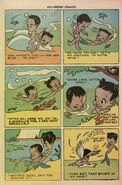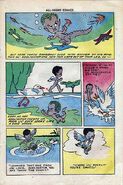Joan Bacchus Maynard (August 29, 1928 - January 22, 2006) was a writer and penciller for the Golden Legacy line of history comics. She is best known for her efforts in preserving the historical black settlement Weeksville in Brooklyn.
Early Life and Career[]
Joan Cooper was born in Brooklyn in 1928. Her father, John Cooper, a ventriloquist, and mother Julia (née St. Bernard), told her stories about the oppression of blacks; she recalled them discussing a newspaper story about the lynching of a pregnant black woman.
She attended Bishop McDonnell Memorial High School. Upon graduation, she received a scholarship to the Art Career School in Manhattan. Joan was also a Revson Fellow at Columbia University and received an honorary doctorate from the Bank Street College of Education. She graduated from Empire State College of the State University of New York and worked as a commercial artist, including as an art director for McGraw-Hill. She drew covers for Crisis, the publication of the National Association for the Advancement of Colored People.
It is possible, though not proven, that she created the "Dew Dillies" for the first and only issue of "All-Negro Comics" in 1947. The work is credited solely to "Cooper," and its babyish pixie characters and cutesy style lends itself to a theoretical female creator.[1] This supposition has proven to be in error. the Dew Dillies in All-Negro comics was drawn and possibly written by Len Cooper, who dew the Hep Chicks page.
Around 1966, she connected with Bertram Fitzgerald, who had started Golden Legacy, a line of comic books about important figures in black history. She then wrote and pencilled the issues about Harriet Tubman, Matthew Henson, and Joseph Cinque & La Amistad mutiny.
Later Life and Weeksville[]
The Weeksville settlement began in the 1830's when escaped slaves and free blacks bought property there. It quickly became a thriving community with schools, churches, an orphanage and one of the nation's first black newspapers, The Freedman's Torchlight. Among the 19th-century residents of Weeksville was Susan McKinney Steward, who in 1870 became the first female African-American physician in New York State.
In 1968, as Pratt Institute historian James Hurley began to hunt down Weeksville's forgotten location, Maynard became a founding member of the Weeksville Society and served as president from 1972 until 1974, when she became executive director. Due to her efforts, Weeksville was give landmark status by New York City's Landmarks Preservation Commission, and was listed on the National Register of Historic Places.
She raised funds for restoration efforts, taking slides to scores of schools and community groups to win support. She pieced together financing from governments, corporations, and children collecting pennies. She donated all her personal savings. Decades of her hard work were rewarded in June 2005 when the houses of Weeksville were opened to the public after a $3 million renovation. At that time, the society changed its name to the Weeksville Heritage Center.
Maynard's oft-stated mission was nurturing a sense of identity and history among black children. She said in an interview with The New York Times in 1991, "The kids have to learn they're not trash."
Among the many awards she received was the Louise DuPont Crowninshield Award from the National Trust for Historic Preservation, of which she had been a trustee. She retired in 1999, but continued to promote Weeksville.
Maynard was married twice, once to a man named Bacchus and once to one named Maynard, and divorced twice. Her son, Jerome, died before her, and she left no immediate survivors.





